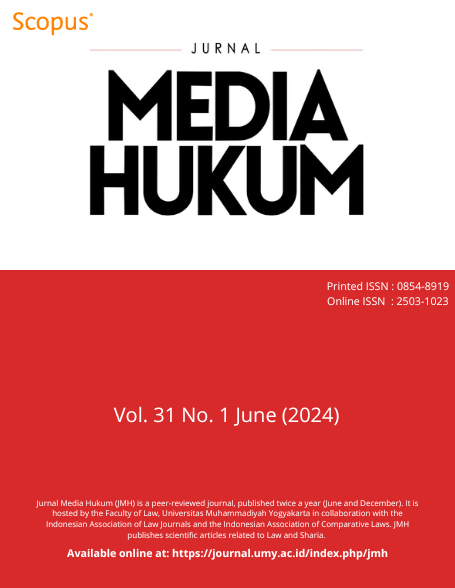Utilitarian Policy of Criminalization for the COVID-19 Vaccine Refusal in Indonesia
DOI:
https://doi.org/10.18196/jmh.v31i1.21564Keywords:
COVID-19, Criminalization, Human Rights Violations, Utilitarian Humanism, Vaccine RefusalAbstract
This article aims to analyze several issues of the implementation of the regulation of vaccination in Indonesia, encompassing the issues of the imposition of criminalization following the vaccination refusal, discussion on its objective, and practical challenges that potentially emerge. As qualitative research, this article employed a normative legal approach and social contextualization to comprehend regulations, legal interpretations, and arguments. This article finds that the government has amended the Presidential Regulation No. 99 of 2020 on the Procurement and Implementation of Vaccination to the Presidential Regulation No. 14 of 2021 on the Change of the Presidential Regulation No. 99 of 2020 in dealing with the issue of punishment imposed on those refusing the vaccination. From the perspective of utilitarian humanism, the regulation aims to ensure the success of the vaccination and is expected to result in the herd immunity of society that determines the social welfare in the country. The implementation of the regulation is being criticized on the practical level because it is claimed to raise the likelihood of the violation of human rights and overlook the public trust on account of excessive criminalization. This article argues that support from society is vital in the implementation of the regulation, while a positive campaign over public vaccinations need to be massively urged.References
Aditya, Zaka Firma, and Sholahuddin Al-Fatih, ‘Indonesian Constitutional Rights: Expressing and Purposing Opinions on the Internet’, International Journal of Human Rights, 0.0 (2020), 1–25 <https://doi.org/10.1080/13642987.2020.1826450>
Al-Fatih, Sholahuddin, and Felinda Istighfararisna Aulia, ‘Tanggung Jawab Negara Dalam Kasus COVID-19 Sebagai Perwujudan Perlindungan HAM’, Jurnal HAM, 12.3 (2021), 349–66 <https://doi.org/10.30641/ham.2021.12.349-366>
Amrianto, Andika Dwi, Maria Kunti, Atika Putri, Ahmad Yusup, Dan I Putu, and Aditya Darma Putra, ‘Kriminalisasi Dan Reformulasi Perbuatan Prostitusi Dalam Hukum Pidana: Catatan Kritis Atas Minimnya Pengaturan Perbuatan Prostitusi Di Indonesia’, Jurnal Penegakan Hukum Dan Keadilan, 4.2 (2023), 123–43 <https://doi.org/10.18196/JPHK.V4I2.18091>
Andini, Orin Gusta, Nilasari, and Andreas Avelino Eurian, ‘Restorative Justice in Indonesia Corruption Crime: A Utopia’, Legality: Jurnal Ilmiah Hukum, 31.1 (2023), 72–90 <https://doi.org/10.22219/ljih.v31i1.24247>
Ansari, Tunggul, and Setia Negara, ‘Normative Legal Research in Indonesia: Its Originis and Approaches’, Audito Comparative Law Journal (ACLJ), 4.1 (2023), 1–9 <https://doi.org/10.22219/ACLJ.V4I1.24855>
Ariefulloh, Ariefulloh, Hibnu Nugroho, Angkasa Angkasa, and Riris Ardhanariswari, ‘Restorative Justice-Based Criminal Case Resolution in Salatiga, Indonesia: Islamic Law Perspective and Legal Objectives’, Ijtihad : Jurnal Wacana Hukum Islam Dan Kemanusiaan, 23.1 (2023), 19–36 <https://doi.org/10.18326/IJTIHAD.V23I1.19-36>
Belenko, Steven, Matthe Hiller, and Lea Hamilton, ‘Treating Substance Use Disorders in the Criminal Justice System’, Current Psychiatry Reports, 15.11 (2013), 1–11 <https://doi.org/10.1007/S11920-013-0414-Z/METRICS>
BPOM, ‘Badan POM Terbitkan EUA Untuk Vaksin Zifivax Sebagai Jenis Vaksin COVID-19 Kesepuluh Di Indonesia’, BPOM, 2021 <https://www.pom.go.id/siaran-pers/badan-pom-terbitkan-eua-untuk-vaksin-zifivax-sebagai-jenis-vaksin-covid-19-kesepuluh-di-indonesia> [accessed 3 February 2024]
Clement, Matt, ‘Deconstructing Criminalization Processes’, Contention, 11.1 (2023), 89–103 <https://doi.org/10.3167/CONT.2023.110105>
Disemadi, Hari Sutra, ‘Lenses of Legal Research: A Descriptive Essay on Legal Research Methodologies’, Journal of Judicial Review, 24.2 (2022), 289–304
Indonesia, CNN, ‘WHO Sebut Tak Setuju Negara Wajibkan Vaksinasi Covid’, CNN Indonesia, 2021 <https://www.cnnindonesia.com/internasional/20210113111735-134-593040/who-sebut-tak-setuju-negara-wajibkan-vaksinasi-covid> [accessed 3 February 2024]
Irwansyah, Penelitian Hukum: Pilihan Metode & Praktik Penulisan Artikel, ed. by Ahsan Yunus (Yogyakarta: Mirra Buana Media, 2020)
Jörgensen, Eva, Laura Wood, Margaret A. Lynch, Nicholas Spencer, and Geir Gunnlaugsson, ‘Child Rights during the COVID-19 Pandemic: Learning from Child Health-and-Rights Professionals across the World’, Children, 10.10 (2023), 1–17 <https://doi.org/10.3390/children10101670>
Kalverkämper, Jaakko, ‘Re-Imagining Criminal Justice: The Ethical Fusion of Substantive Law and Procedural Law’, Social Science Chronicle, 2.1 (2023), 1–18 <https://doi.org/10.56106/ssc.2023.006>
Ketaren, Filemon, ‘Problematika Yuridis Tentang Surat Dakwaan Batal Demi Hukum Dalam Perkara Pidana’, Tadulako Master Law Journal, 7.1 (2023), 131–45 <http://jurnal.untad.ac.id/jurnal/index.php/TMLJ/article/view/17463/pdf>
Maruli, Sahat, and Tua Situmeang, ‘Politics of Criminal Law Against Criminalization and Decriminalization Policies in The Legal System in Indonesia’, Res Nullius Law Journal, 4.2 (2022), 201–10 <https://doi.org/10.34010/RNLJ.V4I2.7166>
Novalia, Isma, Firdha Susanto, Bayu Aji Satria, and Sholahuddin Al-Fatih, ‘Government Legal Act Comparison Between Indonesia and South Korea in Handling Covid-19 Pandemic’, Indonesian Journal of Law and Policy Studies, 2.1 (2021), 43–55 <https://doi.org/10.31000/IJLP.V2I1.4415.G2545>
Nugraha, Aisya Sanghra Devi, Eliza Putri Sanggarwati, and Sholahuddin Al-Fatih, ‘Government Legal Policy: Dampak Pembebasan Bersyarat Narapidana Selama Pandemi COVID-19’, Indonesia Law Reform Journal, 2.1 (2021) <https://doi.org/10.22219/ilrej.v1i2.17185>
Nurrahmi, Nabila, Reny Fitriana Kaban, and Hidayat Sofyan Widjaja, ‘The Effects of Religiosity and Halal Knowledge on the Decision to Use the Covid-19 Vaccine’, Ilomata International Journal of Social Science, 4.3 (2023), 376–89 <https://doi.org/10.52728/IJSS.V4I3.788>
Prastiwi, Devira, ‘5 Fakta Soal Anggota DPR Ribka Tjiptaning Tolak Vaksin Covid-19’, Liputan 6, 2021 <https://www.liputan6.com/news/read/4463720/5-fakta-soal-anggota-dpr-ribka-tjiptaning-tolak-vaksin-covid-19> [accessed 3 February 2024]
Qi, Fei, and Luanjiao Hu, ‘Including People with Disability in the COVID-19 Outbreak Emergency Preparedness and Response in China’, Disability and Society, 35.5 (2020), 848–53 <https://doi.org/10.1080/09687599.2020.1752622>
RA, Mohammad Syahrul, Yusuf Hamdika, and Sholahuddin Al-Fatih, ‘The Impact of COVID-19 Through the Lens of Islamic Law: An Indonesian Case’, Lentera Hukum, 7.3 (2020), 267–78 <https://doi.org/10.19184/EJLH.V7I3.18983>
Rachman, Fajar Fathur, and Setia Pramana, ‘Analisis Sentimen Pro Dan Kontra Masyarakat Indonesia Tentang Vaksin COVID-19 Pada Media Sosial Twitter’, Health Information Management Journal, 8.2 (2020), 100–109 <https://inohim.esaunggul.ac.id/index.php/INO/article/view/223/175>
Rakhmawati, Nur Aini, Muhammad Iqbal Aditama, Rizqeya Irfan Pratama, and Kevin Hafizzana Untoro Wiwaha, ‘Analisis Klasifikasi Sentimen Pengguna Media Sosial Twitter Terhadap Pengadaan Vaksin COVID-19’, JIEET (Journal of Information Engineering and Educational Technology), 4.2 (2020), 90–92 <https://doi.org/10.26740/JIEET.V4N2.P90-92>
Randolph, Haley E., and Luis B. Barreiro, ‘Herd Immunity: Understanding COVID-19’, Immunity, 52.5 (2020), 737–41 <https://doi.org/10.1016/j.immuni.2020.04.012>
Rosenfeld, Richard, and Mark T. Berg, ‘Studying Crime Trends: Introduction to the Special Issue’, Journal of Contemporary Criminal Justice, 40.1 (2023) <https://doi.org/10.1177/10439862231189977>
Roziqin, Ali, Syasya Y.F. Mas’udi, and Iradhad T. Sihidi, ‘An Analysis of Indonesian Government Policies against COVID-19’, Public Administration and Policy, 24.1 (2021), 92–107 <https://doi.org/10.1108/PAP-08-2020-0039/FULL/PDF>
Staff, Reuters, ‘Fact Check: Four Children Have Not Died from a COVID-19 Vaccine Containing Microchips’, Reuters, 2020
Sudarsono, Heri, Retty Ikawati, Agus Kurnia, Siti Nur Azizah, and Muamar Nur Kholid, ‘Effects of Religiosity, Halal Knowledge and Halal Certification on the Intention of Muslims to Use the Halal Vaccine during Covid-19 Pandemic’, Journal of Islamic Marketing, 15.1 (2023), 79–100 <https://doi.org/10.1108/JIMA-06-2021-0179/FULL/PDF>
Supriyadi, S, ‘Penetapan Tindak Pidana Sebagai Kejahatan Dan Pelanggaran Dalam Undang-Undang Pidana Khusus’, Mimbar Hukum, 27.3 (2016), 389 <https://doi.org/10.22146/jmh.15878>
Utoyo, Marsudi, Kinaria Afriani, Rusmini Rusmini, and Husnaini Husnaini, ‘SENGAJA Dan TIDAK SENGAJA Dalam Hukum Pidana Indonesia’, Lex Librum : Jurnal Ilmu Hukum, 7.1 (2020), 75–85 <https://doi.org/10.46839/LLJIH.V0I0.298>
Wiratraman, Herlambang P., ‘Does Indonesian COVID-19 Emergency Law Secure Rule of Law and Human Rights?’, Journal of Southeast Asian Human Rights, 4.1 (2020), 306–34 <https://doi.org/10.19184/jseahr.v4i1.18244>
Yasir, Moh., Joko Widodo, and Ali Ashar, ‘Islamic Law and National Law (Comparative Study of Islamic Criminal Law and Indonesian Criminal Law)’, Al Hurriyah : Jurnal Hukum Islam, 6.2 (2022), 82 <https://doi.org/10.30983/alhurriyah.v6i2.4952>










